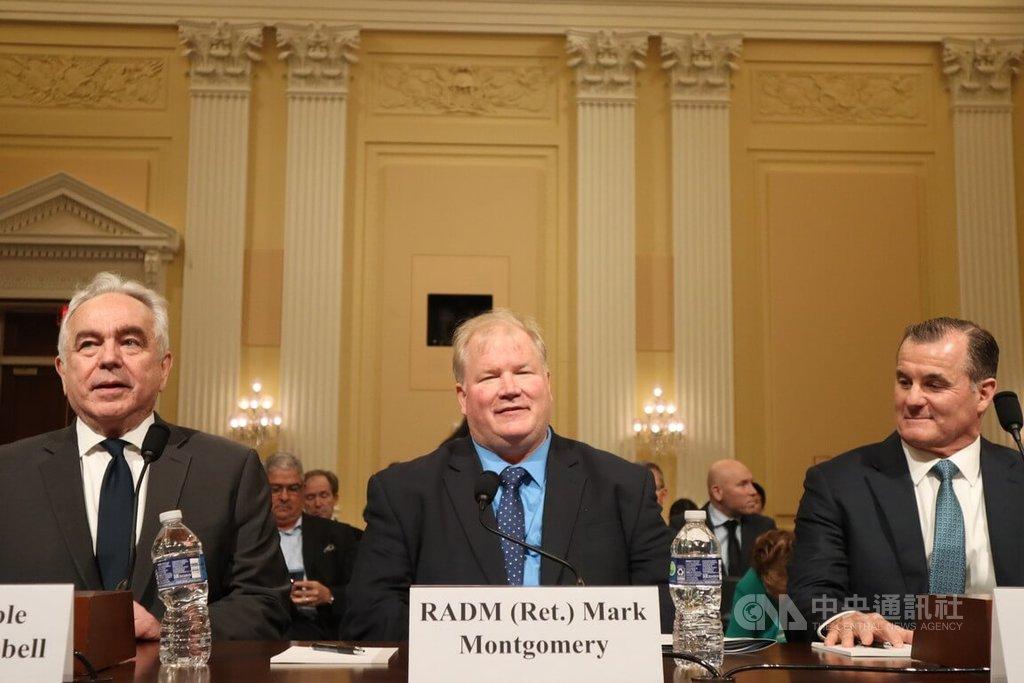Three former US military and political leaders yesterday recommended that Taiwan reasonably increase its defense budget, and the US military increase its training in Taiwan and forces in the Indo-Pacific region to deter Chinese aggression.
The US House Select Committee on Strategic Competition between the US and the Chinese Communist Party held a hearing titled “Deterrence Amid Rising Tensions: Preventing CCP Aggression on Taiwan,” inviting retired US army general Charles Flynn, former deputy secretary of state Kurt Campbell and retired US navy rear admiral Mark Montgomery to give testimonies.
Montgomery said that the US joint training mission in Taiwan should be expanded from 500 to 1,000 personnel, and advocated that Taiwan’s defense budget should reach 5 percent of GDP by 2028.

Photo: CNA
The US has never formally announced the number of troops it has stationed in Taiwan.
The US Congress passed the Taiwan Enhanced Resilience Act in 2023, instructing the executive branch to train Taiwanese troops, but the Ministry of National Defense has been slow to make progress, Montgomery said.
Taiwan still needs the investment and participation of the US military to establish an effective deterrence force with appropriate combat capabilities, he said.
Flynn also emphasized the importance of US military training.
The US could provide Taiwan with 400 Harpoon missile systems, but it is useless if Taiwan does not have teams that know how to operate, deploy and manage these systems, Flynn said.
US military training would help Taiwanese troops understand how to implement defense in depth, which is “the key value we bring as a training unit,” he said.
President William Lai (賴清德) announced a special budget in February, with the goal of increasing defense spending to at least 3 percent of GDP.
US Representative Dusty Johnson said that there is no consensus within Taiwan’s divided government to reach this 3 percent goal, questioning whether Montgomery’s proposed 5 percent goal is feasible.
Montgomery said that by spending 5 percent of GDP on the military, Taiwan would be able to purchase all the systems it needs and establish real combat readiness.
Historically for democratic countries, 5 percent is an achievable standard, he said.
Having a military budget equal to 10 percent of GDP is unrealistic for Taiwan, as this would mean purchasing US$40 billion in Foreign Military Financing (FMF) equipment from the US every year, he said.
“I believe everyone is well aware that we currently cannot even provide US$350 million of FMF annually,” Montgomery said.
Unless the Foreign Military Sales system is completely transformed and its efficiency improved by 1,000 percent, Taiwan’s military budget would not be able to reach 10 percent of its GDP, he said.
Campbell, who left office in January, said that while it is crucial to focus on what Taiwan needs to do and how to support Taiwan, the US must continue to strengthen its own capabilities and shift more forces to the Indo-Pacific region.
“We are the ultimate backing force,” Campbell said.
It is in US interests to continue supporting Taiwan, Campbell said, highlighting the achievements Taiwan has made over the past four years in technology, politics and strategy with US backing.

Alain Robert, known as the "French Spider-Man," praised Alex Honnold as exceptionally well-prepared after the US climber completed a free solo ascent of Taipei 101 yesterday. Robert said Honnold's ascent of the 508m-tall skyscraper in just more than one-and-a-half hours without using safety ropes or equipment was a remarkable achievement. "This is my life," he said in an interview conducted in French, adding that he liked the feeling of being "on the edge of danger." The 63-year-old Frenchman climbed Taipei 101 using ropes in December 2004, taking about four hours to reach the top. On a one-to-10 scale of difficulty, Robert said Taipei 101

A preclearance service to facilitate entry for people traveling to select airports in Japan would be available from Thursday next week to Feb. 25 at Taiwan Taoyuan International Airport, Taoyuan International Airport Corp (TIAC) said on Tuesday. The service was first made available to Taiwanese travelers throughout the winter vacation of 2024 and during the Lunar New Year holiday. In addition to flights to the Japanese cities of Hakodate, Asahikawa, Akita, Sendai, Niigata, Okayama, Takamatsu, Kumamoto and Kagoshima, the service would be available to travelers to Kobe and Oita. The service can be accessed by passengers of 15 flight routes operated by

Taiwanese and US defense groups are collaborating to introduce deployable, semi-autonomous manufacturing systems for drones and components in a boost to the nation’s supply chain resilience. Taiwan’s G-Tech Optroelectronics Corp subsidiary GTOC and the US’ Aerkomm Inc on Friday announced an agreement with fellow US-based Firestorm Lab to adopt the latter’s xCell, a technology featuring 3D printers fitted in 6.1m container units. The systems enable aerial platforms and parts to be produced in high volumes from dispersed nodes capable of rapid redeployment, to minimize the risk of enemy strikes and to meet field requirements, they said. Firestorm chief technology officer Ian Muceus said

MORE FALL: An investigation into one of Xi’s key cronies, part of a broader ‘anti-corruption’ drive, indicates that he might have a deep distrust in the military, an expert said China’s latest military purge underscores systemic risks in its shift from collective leadership to sole rule under Chinese President Xi Jinping (習近平), and could disrupt its chain of command and military capabilities, a national security official said yesterday. If decisionmaking within the Chinese Communist Party has become “irrational” under one-man rule, the Taiwan Strait and the regional situation must be approached with extreme caution, given unforeseen risks, they added. The anonymous official made the remarks as China’s Central Military Commission Vice Chairman Zhang Youxia (張又俠) and Joint Staff Department Chief of Staff Liu Zhenli (劉振立) were reportedly being investigated for suspected “serious